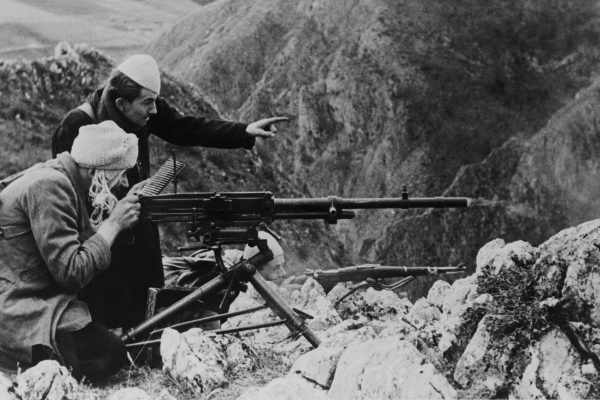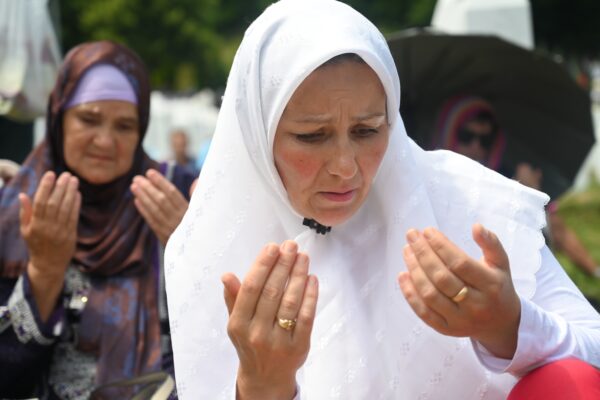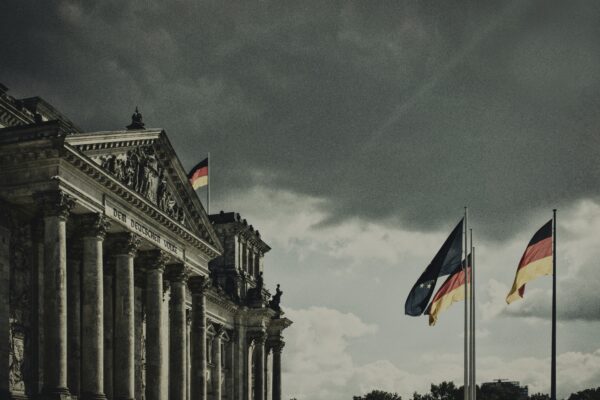I sat in the middle of the makeshift refugee camp for an hour and a half, just watching. Thinking of ways I could start a conversation. I was in Belgrade’s city center, in the park between the train and bus stations, but I could have been in a third world country among the war-displaced. The refugees here move on after a day or two and are fleeing some of the worst conditions, so I thought it would seem odd to walk up to a stranger and say hi. They might even get suspicious. So I waited.
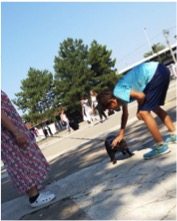
Ahmad darted across the park every time a dog came by, a huge smile on his face. He would first reach out his hand to allow the dog to smell him and if it accepted, he gave the animal a pat on the head. He would start a conversation with the pet owner, asking about the name and habits of their pet. After watching this go on for over an hour, I knew he was the one I wanted to talk to. When I approach him, he was petting a blondish lap dog.
“You love dogs,” I tell him in Arabic.
“Yes, so much. I love dogs.”
“I’m Anisa, what’s your name?”
“Ahmad.”
“Where are you from Ahmad? ”
“From Syria,” he said and then continued petting the dog.
“Where from in Syria?”
“The city of Idlib.” He makes eye contact with every reply. “Back home in Syria, I had five dogs,” he says with enthusiasm, holding up five fingers.
I notice a woman watching us, so I go over and introduce myself. Her name is Rouqayah, Ahmad’s mother. She seems to be hearing impaired because Ahmad repeats everything I say for her. She tells me the three of them will leave for Germany tomorrow, inshaAllah, God willing, she and her two sons.
I suddenly find myself surrounded by a group of people eager to speak to me. One man, also named Ahmed, asks if I know where a halal restaurant is. The road must have been hard and he wants to take his wife and children out to eat. I find his question endearing.

Um Abdurrahman hangs in the back, but I see she wants to talk. Dressed in a black coat dress typically worn by Syrian women and head covered in a black cotton hijab, Muslim head covering, I greet her and we kiss each other’s cheeks. She and her family arrived in Belgrade the night before.
She, her husband and two children are on their way to Germany to reunite with four of her children already there. Mother of eight, she leaves behind two adult children with families of their own. When will they return to Ghouta in the Damascus countryside again? The future is uncertain. That is the one constant for everyone, the uncertainty.
When I heard Um Abdurrahman is from Ghouta, I take out my phone to show her Abu Al Foz’s art work. He is an artist from the same area. He turns munitions into beautiful bejeweled works of art. She looked at it and says, “Yes, they drop many bombs on us every day. “ She looks tired; she hasn’t given up, but you can see in her eyes she’s holding on.
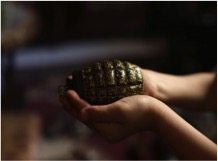
People ask if I know how life in Germany and Sweden are, and do I think it will be a good place for them? I reply, “inshaAllah,” God willing, because anything has to be better than what they left. However, what everyone wants to know is how to get to America. Images of Rita Moreno in Westside Story float through my mind. America, the promised land. I knew of Syrians that made it to the US. Most aren’t doing well, not for lack of trying, but because of a lack of material and psychological support.
I’m not an immigrant or the child of an immigrant, or even the grandchild of an immigrant. I don’t know how it feels, but I have started over. I have felt loss and bitter disappointment in my life. I have also felt alone. So I can understand their human experience at some level.
* * *
Back in California where I first met Lina, fresh from Damascus, she was escaping from home because the Syrian government was looking for her. She never traveled further than her home city, but here she was, in the US, alone and without support. Mahmoud, Ahmad, Hazen, Ziyad and Yaman all have similar stories and are trying to start over, but it’s the guilt. It’s the loss that prevents them from enjoying their new home, while their families continue to suffer. A Syrian-Christian family of five, who wish to remain anonymous, literally relied on the kindness of strangers. The police picked them up and called the organization I work for to seek assistance for them. The father, a man fascinated by our large parking structures and diversity, is certain his family is going to do well here, but still thinks about home. I’m also proud of my country’s diversity and how we all manage to coexist yet, there is no going home for me. This is home and I can’t imagine ever being force to leave it.
US immigration policy towards Syrians makes it almost impossible for them to come here as refugees and if you are not a refugee, you have minimal, to no support at all. It still takes over a year to bring an ailing mother, father or spouse. It is not only a fear of ISIS that brought greater restrictions, there is no clear policy. Now ISIS is being used as the reason, even though there is no evidence that the Syrian people support ISIS in anyway. They only have the misfortune of being invaded by them, an insult added to the injury.
* * *
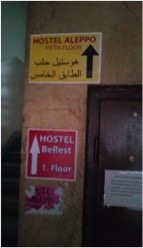
Leela invited me for a late afternoon meal in her Belgrade apartment. She is an elegant and mature Serbian woman who holds herself with an air of confidence. Her warmth is felt though out her home and the décor reflects her interest in world cultures. She just returned home from a political meeting about government reform. She holds out an arm-full of papers for me to see, proud of her work to help improve her country.
We sit down and she is curious about the US political milieu so we chat about that for a while, before getting down to the reason I was there. She lives in the same building as Hostel Aleppo and she’s concerned about the refugees. She tells me about a family she and her friend met in the park one day.
“In May, Oliva and I saw an Afghani family in a park near here. There was a mother, father and two small children. They were standing under a mulberry tree and the father was collecting berries in his shirt. We went and asked him if they would like us to buy them cherries, strawberries and other fruit. The father said no. He said that in the courtyard of their house they have the same tree and the fruit on it must be ripe now too. He said the children love to eat them and it makes them happy to eat this fruit and remember home. Then we all cried.”
* * *
A year has passed since I sat in that Serbian park, and on that one-year anniversary I found myself in Norway meeting with the refugees who made that trip twelve months ago. I don’t know what happened to most of the people I meet in Serbia. I can only hope that they reached their destinations and are starting over.
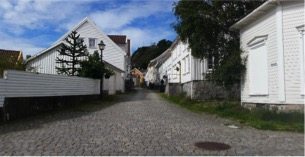
Nothing significant has changed. The war continues and the refugees continue to look for safety in Europe. Depression, hopelessness and post-traumatic stress are the hallmarks of refugee lives. So many of them fled Syria thinking they would save their families, but as European countries increased the wait time for family reunification, even that last, desperate effort on the part of so many Syrians was snatched away like all the other promises made by the international community.
Now, they can only watch as their families back home struggle and die in their absence. It’s a Macomb show they force themselves to watch nightly as they remain hyper-connected to news from back home. They have grown accustomed to disappointment and wonder when, and if, they will ever return home. Some wonder if they will be welcomed back.
I can’t imagine being forced to leave home, the place where I learned to walk, where I grew up. Home, where the memory of hotdogs on Independence Day makes me smile. When I traveled abroad as a child, the very sight of my country’s flag brought me comfort. Even a McDonald’s, a place I refuse to eat at, brings a flood of memories, of home. My country, a place my ancestors bleed for and bled on. Home, more nostalgia than a physical place. I can’t imagine leaving, but if I did, I hope there is a country to welcome me, home.
Photo Credit: Anisa Abeytia and Bassam Al-Hakeem
Anisa Abeytia is a published author and poet. Her work is translated into over 12 languages and covers wide ranging topics from science to art. After earning her B.A in Creative Writing from the University of Southern California, Abeytia started her career working for one of the producers of the “Godfather Trilogy.” She later attended graduate school at Stanford University and holds a Master’s of Art and Science. Over the last four years she was active in advocating for the Syrian cause and most recently for refugee rights. She is the director of “Anywhere But Home,” a documentary following the journey of Syrian refugees to Norway. She is also the producer of “I Am My Homeland,” a film that documents the experience of Syrian-Americans and Syrian refugees in the U.S.
